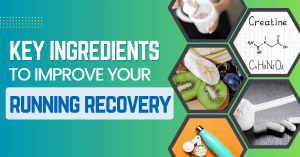Once known mainly for helping improve skin and wrinkles, collagen peptides are one of the latest supplements to take the running world by storm in our never-ending quest to improve recovery.
More than likely, you’ve noticed an influx of collagen infused foods and supplements in the healthy food and supplement isles over the last few years as the industry continues to grow.
But, what benefits do collagen peptides actually provide and does the research actually show they are effective?
That’s what we’ll look at today in this article.
What is Collagen?
Collagen is a strong and flexible protein found in our bones and connective tissue.
Because it’s so strong and flexible, collagen provides the framework or webbing to a lot of the soft tissue in the body.
There are many different types of collagen, but the three most important for runners are Type I, II and Type III.
- Types I and III are used to reinforce or structural systems, like our bones.
- Type II is used mainly in cartilage and has a rigid construction that allows for shock absorption.
With healthy and strong collagen levels, your ligaments and joints will be more flexible and your body will better handle the pounding that comes with running so many miles.
Does the Research Show Collagen Supplementation is Effective?
Now that you have a little better understanding of what exactly collagen is, does research show that supplementing lives up to the hype?
We’ll take a look at some of the most common claims and see what research has to say.
Reduce Recovery Time from Injury
Perhaps the most beneficial potential benefit of collagen for runners is the potential reduction in recovery time.
It’s theorized that because collagen plays a critical role in maintaining healthy cartilage and connective tissue, supplementation may increase the rate of healing from knee and other tendon injuries, as well as improve general recovery from the impact of running.
There is a decent amount of research to substantiate this theory.
Specifically, a June 2020 literature review of 15 studies on collagen supplementation in recreational runners.
The combined studies indicated that collagen supplementation improved joint pain and recovery from joint injuries, reduced muscle soreness and time to recover from exercise, and increased muscle protein synthesis.
Strengthen Tendons, Ligaments and Joints
Another important potential benefit to runners, especially us older runners, is the ability for collagen supplementation to improve the strength of our tendons, ligaments and joints and improve flexibility.
This is because of the role collagen plays in the health of our connective tissue.
With healthy connective tissue, we can improve range of motion and flexibility, reducing the risk of many common running injuries.
This seems to be supported in the scientific literature as well. One example is a double blind study that assessed joint mobility in a group who had used a collagen supplementation and a group that only used a placebo.
The collagen group demonstrated a statistically significant improvement in average joint range of motion compared to the placebo group.
Accelerate Muscle Repair and Growth
Another interesting use case for runners is the potential for collagen to improve muscle repair and growth.
As discussed earlier, we’ve already seen evidence that collagen supplementation can increase muscle protein synthesis. This seems to be further increased when combined with whey protein.
It appears the amino acids in the whey protein help synthesize the collagen, which can speed up the muscle rebuilding process.
However, it’s important to note that studies indicate substituting collagen for whey protein does not improve muscle protein synthesis. They should be used in conjunction, with whey being the more important of the two supplements.
Improved Bone Health
Finally, there is some evidence that collagen supplementation can help improve bone health and bone mass, especially in older women.
This is likely because Type I collagen is the main extra cellular matrix protein for calcification.
However, as of this writing, these studies have only been conducted on animals. Therefore, more research on humans needs to be done, but the results do appear promising.
The Best Way for Runners to Take Collagen
Now that we are relatively confident collagen supplementation is supported by quite a bit of scientific research, what’s the best way to take it?
Effective dosages
The literature demonstrates that supplementing with 2.5 to 5 grams of hydrolyzed collagen seems to be the sweet spot.
Most studies indicated that higher doses of hydrolyzed collagen didn’t improve outcomes or have a statistically significant impact on effectiveness.
Other Considerations
There are two types of collagen supplements, hydrolyzed collagen and undenatured collagen.
It appears that undenatured collagen is used primarily to treat osteoarthritis and rheumatoid arthritis. Almost all the studies on athletes we looked at used hydrolyzed collagen.
Therefore, I recommend hydrolyzed collagen if you’re going to supplement.
My recommendation is CollaGenius from BiOptimzers. It contains an efficacious dose at 2.5g with no added fillers or proprietary blends, which you know from previous articles I am ardently against.
Plus, it also includes an awesome dose of concentrated mushrooms. I discussed the full research and benefits of mushrooms for runners in this article, but in short, numerous studies have shown that they improve brain cognition, reduce time to fatigue, and improve cardiovascular function.
Personally, I take my collagen in the mornings, post workout. Therefore, the added cognitive support helps improve my mental clarity for the morning without taxing my adrenals with excessive caffeine (which I am guilty of doing too often).
If you’re interested in trying it out, here’s a link to save 10% on your purchase.
Summing It Up
While the scientific literature is still relatively new, it does appear adding a collagan supplement could be beneficial, especially if you struggle with tendon or bone injuries like shin splints and stress fractures.
Taking 2.5-5 grams daily, either in the morning or post workout with a whey protein shake could help you recover faster and avoid injury.







